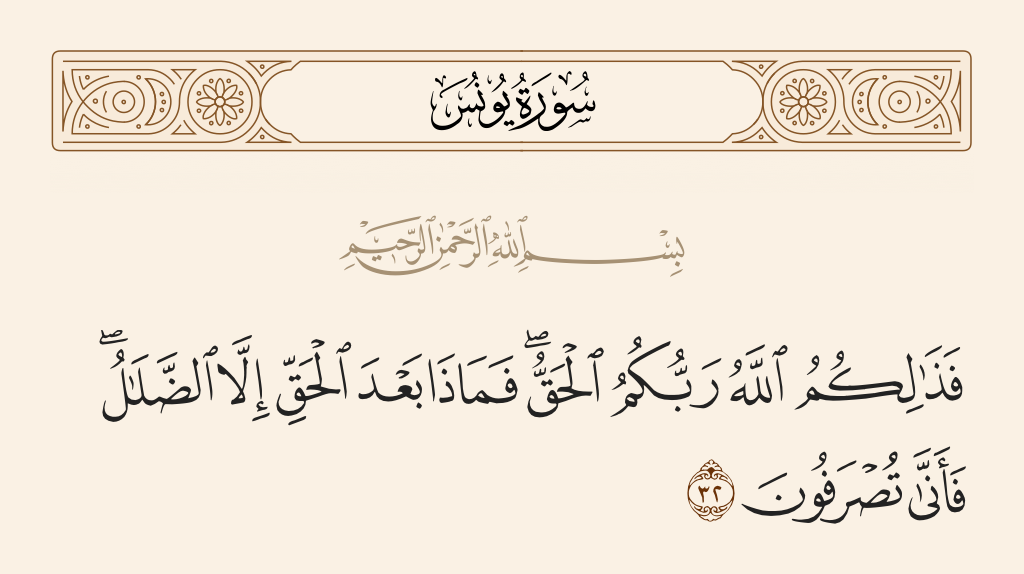Surat Yunus Verse No. 32: Reading and listening
Translation of the verse 32 from Surah Yunus : Number of verses 109 - - page 212 - Part 11.

﴾فَذَٰلِكُمُ ٱللَّهُ رَبُّكُمُ ٱلۡحَقُّۖ فَمَاذَا بَعۡدَ ٱلۡحَقِّ إِلَّا ٱلضَّلَٰلُۖ فَأَنَّىٰ تُصۡرَفُونَ ﴿
[ يونس: 32]
Such is Allah, your Lord in truth. So after the truth, what else can there be, save error? How then are you turned away?
English - Sahih International
For that is Allah, your Lord, the Truth. And what can be beyond truth except error? So how are you averted?
Tafheem-ul-Quran by Syed Abu-al-A'la Maududi
(10:32) Such, then, is Allah, your true Lord. *38 And what is there after truth but error? How, then, are you being turned away? *39
Tafheem-ul-Quran by Syed Abu-al-A'la Maududi
*38). Since it is God alone Who has the power to do all that has been mentioned here - the provision of livelihood, the bestowing of vision and hearing, the granting of life and causing death, and since even the unbelievers affirmed that it is Allah alone Who causes all that, then it is obvious that He alone deserves to be held as the true Lord, Provider and Master of man, and hence the Only One Who deserves to be worshipped. How, then, can any others than Allah - those who have no share in any of the things mentioned above - be considered to have any share in His Lordship?
*39). Addressing the generality of the unbelievers, the Qur'an inquires: 'How. then, are you, being turned away?' The question that is posed here makes it clear that it is not the unbelievers themselves who are guilty of turning away, rather they are being made to turn away from the right way and that this is happening under the influence of some person or group who is engaged in misleading people, It is for this reason that in effect people are being asked: 'Why should they go about blindly following those who are out to mislead people? Why should they not use their brains and think for themselves why they are being turned in a direction which is contrary to reality?'
This mode of questioning, with some modifications, appears on a number of occasions in the Qur'an. On all such occasions the question has been asked in the passive voice. This was presumably to avoid a pointed reference to those who were actually engaged in misleading people. This should make it possible for people who had held these leaders of misguidance in considerable esteem to consider the matter dispassionately. Such a mode should also spare them any provocation that might impair their capacity to think about the issue coolly. For it is quite obvious that pointed references to specific persons might have been exploited so as to provoke people by pointing out that their venerated forefathers and religious mentors were being maliciously criticized and attacked.
This manner of address - the use of the passive rather than the active voice and the avoidance of pointed references to specific persons as the ringleaders of misguidance and mischief - embodies a valuable piece of wisdom for those who seek to invite others to accept the Message of Islam.